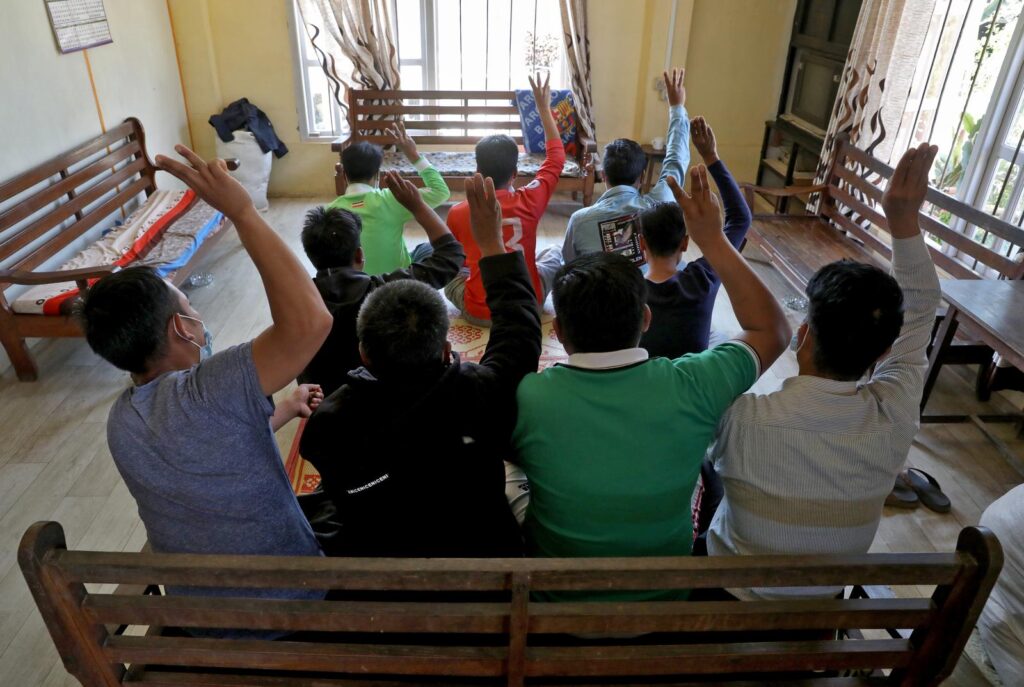The Network Helping Hundreds Of Myanmar Police Flee To India
Mar 25, 2021 | Pratirodh Bureau
Myanmar nationals, including those who said they are police and firemen and recently fled to India, flash the three-finger salute at an undisclosed location in Mizoram, near the India-Myanmar border on March 15, 2021
Strung across remote mountain settlements, a secret network of activists and volunteers is helping spirit hundreds of defecting Myanmar policemen away from the military’s brutal crackdown on dissent and into relative safety in a small northeastern Indian state.
Their escape – by car, motorcycle and on foot through densely forested terrain – is often guided by volunteer-led groups on both sides of the border, according to accounts from at least 10 people who are involved in the loose-knit network or have used it to cross the border. Once in India, local activists and residents provide food and shelter in safe houses, the people said.
Some police personnel have said they fled Myanmar because they feared persecution after refusing to obey the military junta’s orders to shoot protesters.
More than 1,000 people fleeing violence in Myanmar have crossed into neighbouring India’s Mizoram state since late February, according to Indian lawmaker K. Vanlalvena, Reuters has reported. That includes about 280 Myanmar police and more than two dozen fire department personnel, according to a senior police official in Mizoram.
The tools used by members of the network are simple: social media messaging apps, mobile phone SIM cards from both countries, hardy jeeps and a knowledge of smuggling routes along the Tiau River, a narrow ribbon of water flowing between sparsely populated mountains that separate India and Myanmar.
Several police personnel told Reuters they feared imprisonment if caught fleeing by Myanmar authorities.
“It is a matter of life and death,” said a 29-year-old activist named Puia, who has been assisting people arriving from Myanmar in eastern Mizoram’s Champhai town, a seven-hour drive away from the state’s capital of Aizawl. He asked to be identified by only part of his name.
More than 280 people have been killed in Myanmar amid a wave of protests in the southeast Asian country demanding the return of the civilian government led by elected leader Aung San Suu Kyi, according to figures from the Assistance Association for Political Prisoners (AAPP) activist group. The group says thousands of people have been detained since the military staged a coup on Feb. 1.
On Wednesday, the junta freed hundreds of people who had been arrested during the crackdown on demonstrations, according to witnesses and the AAPP.
Myanmar’s military, officially known as the Tatmadaw, didn’t respond to a request for comment.
The junta, earlier this week, accused anti-coup protesters of arson and violence while also expressing sadness for the deaths of what it said were 164 demonstrators. It added that it would use the least force possible to quell violence.
Myanmar’s military has said a Nov. 8 election won by Suu Kyi’s party was fraudulent – an accusation the country’s electoral commission has rejected. Military leaders have declared a state of emergency. They have promised a new election but have not set a date.
The influx from Myanmar could pose a diplomatic challenge for India, which has close relations with the Tatmadaw.
The arrivals from Myanmar have also generated some disagreement between India’s federal government, which wants to keep them out, and Mizoram’s state administration, that is keen to provide assistance in line with local sentiment. Tribes in Mizoram share close ties with Myanmar’s Chin community, which is dominant in the areas bordering the Indian state.
The Indian foreign ministry and the Mizoram state government didn’t respond to requests for comment.
India’s foreign ministry has previously expressed “deep concern” over the military coup, saying democracy and the rule of law must be upheld. The Indian government has issued a directive to four states sharing a border with Myanmar, including Mizoram, to tighten security, according to three Indian officials.
Mizoram state’s Chief Minister Zoramthanga has urged Indian Prime Minister Narendra Modi to grant asylum to “political refugees” from Myanmar. The situation in neighbouring Myanmar is a “human catastrophe of gigantic proportions” that India couldn’t ignore, wrote Zoramthanga, who uses only one name, in a March 18 letter to Modi.
